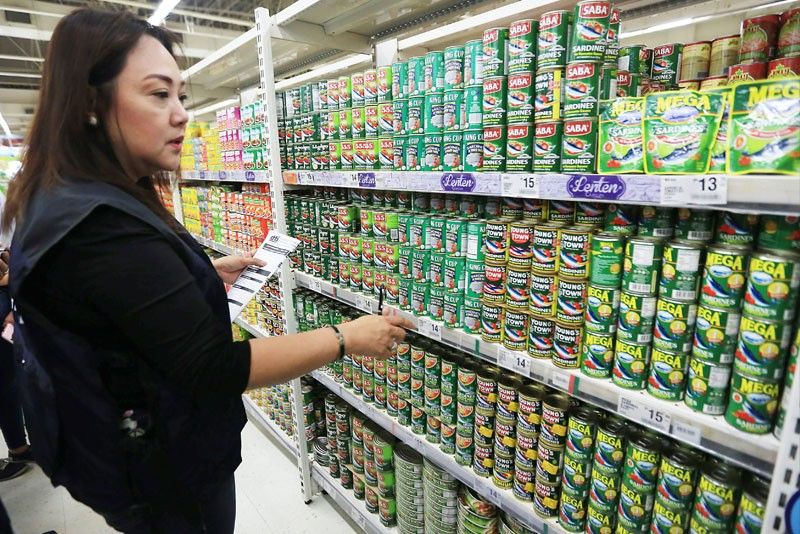DTI expands monitoring of prices to more stores

MANILA, Philippines — As suspicion mounts on the role of profiteers in the steady rise in the prices of basic goods, the government is expanding its price monitoring activities to include 600 stores in Metro Manila and 500 in the provinces.
“With respect to the commitment following the direction of our President last Saturday, we said that our monitoring, we will intensify it – from 400 stores and outlets coverage in Metro Manila, we will increase it to 600,” Trade Secretary Ramon Lopez said yesterday.
He added that personnel from the Department of Trade and Industry (DTI) will also monitor 500 stores outside Metro Manila.
“We are double checking with the regions if they can even increase the 500. So these will be the collection of all stores to be monitored outside Metro Manila,” he said.
President Duterte over the weekend mobilized concerned agencies and ordered them to take immediate steps to ease consumer woes and protect them from profiteers taking advantage of the effects of the Tax Reform for Acceleration and Inclusion (TRAIN) law.
According to the trade chief, some of the manufacturers of basic necessities and prime commodities were even selling P1 to P2 below the suggested retail price (SRP) based on DTI’s recent monitoring activities.
Following random market monitoring activities since Monday, Lopez reaffirmed his earlier pronouncement that SRPs for products covered have largely remained unchanged, with price compliance “at 100 percent.”
“Based on our statistics, research, studies and actual monitoring, there have been no price increases. But since there have been concerns in the media and from the public, then we decided to intensify our efforts and place precautionary measures,” he said.
In a related development, the DTI-chaired inter-agency National Price Coordinating Council (NPCC) is pushing for the setting of SRP for major agriculture products to allay concerns over possible profiteering.
The NPCC held an emergency meeting yesterday to get updates on price movements and address “perceptive unreasonable price increase” caused by TRAIN and rising fuel costs.
Lopez said the NPCC has agreed to push for the adoption of an SRP for major agriculture products as suggested by Agriculture Secretary Emmanuel Piñol during their meeting on Tuesday.
Lopez said the Department of Agriculture is set to hold stakeholder consultations today to discuss implementation of SRP.
Initially, the SRP on agriculture products will cover only Metro Manila. Products to be included are pork, beef, chicken, fish, rice, garlic, onion, egg and cooking oil.
“Typically, agriculture products have erratic prices as it depends on the supply, market and origin. We in the government would follow market based-pricing; as much as possible, least interference,” Lopez said.
“However, in times of crisis or like these times when there are observations of price hikes, government can step in and put some order. That’s the reason why it is being done now,” he added.
The DTI is in charge of monitoring prices of basic necessities and prime commodities, while the DA monitors prices of agriculture products being sold in markets.
“But as a whole, the different sectors supported the idea of having an SRP. We are also looking into setting an SRP on imported rice,” Piñol said.
“But I really believe imported rice should not be more expensive than local. In fact, it should be lower than local rice,” the agriculture chief said.
Piñol said setting an SRP for agricultural commodities would be a foil against profiteers.
“I think the movement of the price in the market is more likely caused by speculation, there really is no shortage,” he said.
“That’s the reason why we are moving towards the setting of the SRP, because the moment we are able to determine the SRP, then government will come in. If you violate, if you go beyond the SRP then you will be prosecuted for profiteering.”
The agriculture chief emphasized that the increase in prices of commodities may have been caused by speculation, with profiteering traders using current issues to justify selling their products at higher prices.
“They are blaming the TRAIN law, they are blaming the oil price hike. They will always have a way of justifying the increase in the price of the items in the market. And they would always point out all of these things,” Piñol said.
With prices of basic goods rising steadily, an organization of state workers is demanding a national minimum wage of P16,000/month from the current P10,510/month for employees with salary grade (SG) 1.
“While we completely support the demand of private sector workers for a national minimum wage hike, we also call on government to give attention to the worsening economic condition of its workers, especially lower ranked civilian employees at the local level,” said Ferdinand Gaite, president of the Confederation for Unity, Recognition and Advancement of Government Employees. – Rhodina Villanueva
- Latest
- Trending
































